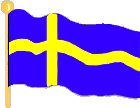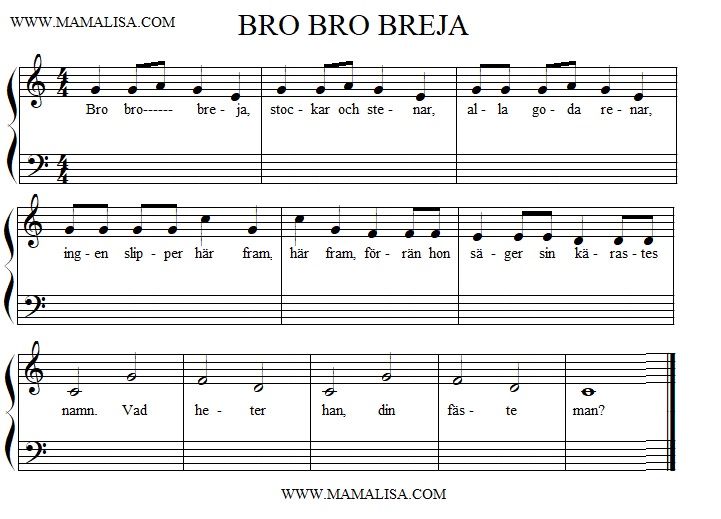Bro bro breja
"'Bro, Bro, Breja' is still sung in Sweden, mainly on June 21st and during Christmas holidays when families gather and dance in rounds while singing folk songs. This song is sung and the game is the same as the English Oranges and Lemons. The Swedish lyrics I learned as a child go like this…" –Brita.
Bro bro breja
Broad Bridge, Bridge
Singing Game
Singing Game
(Swedish)
(English)
Bro bro breja*
Stockar och stenar
Alla goda renar!
Ingen slipper här fram, här fram,
Innan han säger sin kärastes namn.
Vad heter hon?
Broad* bridge, bridge,
Stocks and stones
All good roadsides!**
No one will be allowed to pass by, pass by
Before saying his dearest's name.
What is her name?
Notes
*Breja is old Swedish and old Norse and also nowaday dialect for Swedish "breda", related to the English word broad, simply meaning wide. A broad bridge (for the alliteration on B) or wide bridge.
**"Ren" means "the side of a road", I believe you call it "shoulder" in English. It is also the strip of land between two acres, i.e. in between two pieces of farmland.
The lyrics above are addressed to a boy. When addressed to a girl, the two last lines go:
Innan hon känner sin kärestas namn (Before saying her dearest's name?)
Vad heter han? (What is his name?)
Jonas wrote "This is currently one of my two-year old son's favourites to try to sing. I found your website looking for instructions how to play it on the piano."
A closer translation might be:
Bridge, bridge broad
Stocks and stones
All good shoulders
No one'll slip here through, here through
Until saying his/her dearest's name
What - is - his/her - name?
Game Instructions
"In 'Bro Bro Breja', two children or teenagers, raise their arms and join the palms of their hands to form a bridge. All the others join hands and move in a circle and pass under this 'bridge' while singing the song.
When the song ends, the two lower their arms and whoever happens to be caught in between their lowered arms, is asked: "Vad heter hon?" ('What is her name?') No one can pass her without saying his/her beloved's name. The girl or boy caught has to whisper the name of the boy or girl that s/he likes. Only then is s/he released.
Then the song is sung again and eventually all the people holding hands have whispered the names of their beloved and have been let through. That's how this game ends.
Alternate Ending:
On the last line, the two people making the bridge trap the person. They rock him back and forth while singing the following:
Har du tagit prästens sko
prästens sko, prästens sko
har du tagit prästens sko
ja eller nej?
English Translation:
Have you taken the priest's shoe
The priest's shoe, the priest's shoe
Have you taken the priest's shoe
Yes or no?
The captured person whispers one of the options (yes or no) to those making the bridge, and then goes behind the person who represents this choice. When all have been captured there follows a tug of war between the two sides.
Comments
"In Oranges and Lemons, the game ends with a tug-of-war, not in 'Bro Bro Breja' and 'Al pasar la barca', which allude more to love." -Brita


Thanks!
Thanks!
Thanks!
Thanks and Acknowledgements
Many thanks to Brita Haycraft from International House for contributing and translating this song and for providing the games instructions! Thanks to Jonas Kämpe for helping with the translation and for explaining the meaning of some words. Final translation edited by Lisa.
Tack så mycket!

























